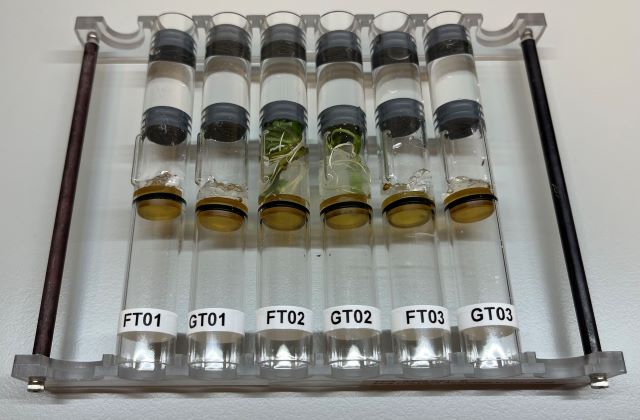
The Astrobotany Lab at Winston-Salem State University is the only space plant biology lab at a historically Black college and university (HBCU). It has a Space Act Agreement with the NASA Kennedy Space Center Crop Production Team.
Three weeks ago, BioServe Space Technologies, which has been supporting space life science research for over 30 years, announced that, in collaboration with an associate professor of botany and plant physiology at Winston-Salem, it loaded fluid processing apparatuses with plant seedlings onboard Blue Origin’s New Shepard-31 mission, which featured an all-female crew.
Some batch experiments were activated during the flight, and the remaining experiments were activated simultaneously on Earth.
According to BioServe, the first use of these fluid processing apparatuses added a new scientific capability to suborbital flights and yet another step in efforts to make space research more accessible.
Following the success of their experiment on Blue Origin’s New Shepard 31 flight, Rafael Loureiro, associate professor of botany and plant physiology at Winston-Salem State University, shared on social media that they have begun preparing the flow chickpea seeds and sweet potato plantlets for shipment to their collaborators in Brazil.
Dr. Loureiro also shared that they have started analyzing the returned samples in their campus laboratory, focusing on early physiological markers.
Two weeks ago, Loureiro shared that when the plant physiology lab at the historically Black college and university (HBCU) launched their plants into space, it marked the first HBCU-led experiment to fly on a Blue Origin mission—and the historic debut of Brazilian chickpeas (BRS Aleppo) in space.
The experiment also included Winston-Salem State University’s lab’s Inkspot tomato seedlings, two cultivars of sweet potatoes, thanks to the USDA, and Arabidopsis thaliana.
Loureiro thanked the Astrobotany Lab students at Winston-Salem State University’s Department of Biological Sciences for their incredible grit and dedication.
He also thanked their Brazilian Space Farming Network collaborators, whose partnership made this the network’s first space-flown experiment. Erwin, who plans to pursue an M.D./Ph.D. focusing on regenerative medicine and plant physiology, couldn’t wait to get the samples back post-mission and continue the work.
Loureiro specializes in plant stress physiology. He received his Master’s and Ph.D. from Brazil’s National School of Tropical Botany, where he gained experience in controlled environment crop science and plant ecophysiology.
Dr. Loureiro’s research currently focuses on analyzing phytohormonal data and microbial-plant interactions to reduce stress and assess the viability of in situ resources for growing crops on the Moon and Mars.
Dr. Loureiro also established the first Space Act agreement between WSSU and NASA’s crop production team at Kennedy Space Center.
Through this agreement, students from minority-serving institutions and historically Black colleges and universities can collaborate with NASA scientists and participate in NASA research.
For the first time in Winston-Salem State University’s history, a student-led research project from the Astrobotany Lab launched into space aboard Blue Origin’s all-female mission.
This groundbreaking initiative, developed by researchers at Winston-Salem, explores how humans can grow food on the Moon, Mars, and beyond.
What began in a small lab at Winston-Salem State University reached the edge of Earth’s atmosphere, demonstrating the power of innovation and academic excellence.
As the only Astrobotany Lab at a historically Black college and university (HBCU), Winston-Salem State University is at the forefront of redefining space science and research possibilities.
The initiative promotes cutting-edge research, student training and mentorship, laboratory development, and future scientific discoveries.
On April 14, three students from Winston-Salem State University—Gabrielle Erwin, Anya Buckner, and Sarah Lang—were in Texas to witness the launch of Blue Origin’s historic all-female space mission.
While they observed from the ground, their scientific research took place aboard the rocket.
In collaboration with Aisha Bowe, a rocket scientist, entrepreneur, and STEM trailblazer, Winston-Salem State University partnered with Odyssey, WSSU’s space science and operations firm, to launch a groundbreaking suborbital space experiment aboard NS-31.
The experiment, led by WSSU’s Astrobotany students and researchers, investigates how crop plants respond to microgravity at the molecular level, advancing sustainable space agriculture and food security on Earth.
This research is part of an ongoing project at WSSU’s Astrobotany Lab, which aims to understand how space conditions impact plant life and explore how plants grow and behave beyond Earth’s atmosphere.
Gabrielle Erwin, a junior biology major, plans to pursue an M.D./Ph.D. focusing on regenerative medicine and plant physiology.
She expressed excitement about returning the samples after the mission to continue her work.
Anya Buckner, a senior, is eager to apply the knowledge gained from her labs and lectures to real-world research and to see the seedlings in space; she aspires to become an emergency room physician or an anesthesiologist.
Sarah Lang, a senior biology major, will soon begin her Master’s in cell and molecular biology at the Florida Institute of Technology. For her, the launch represents the culmination of months of hard work.
The U.S. Army Corps of Engineers has been tasked with…
Brown and Caldwell, a leading environmental engineering and construction firm,…
Humboldt State University, one of four campuses within the California…